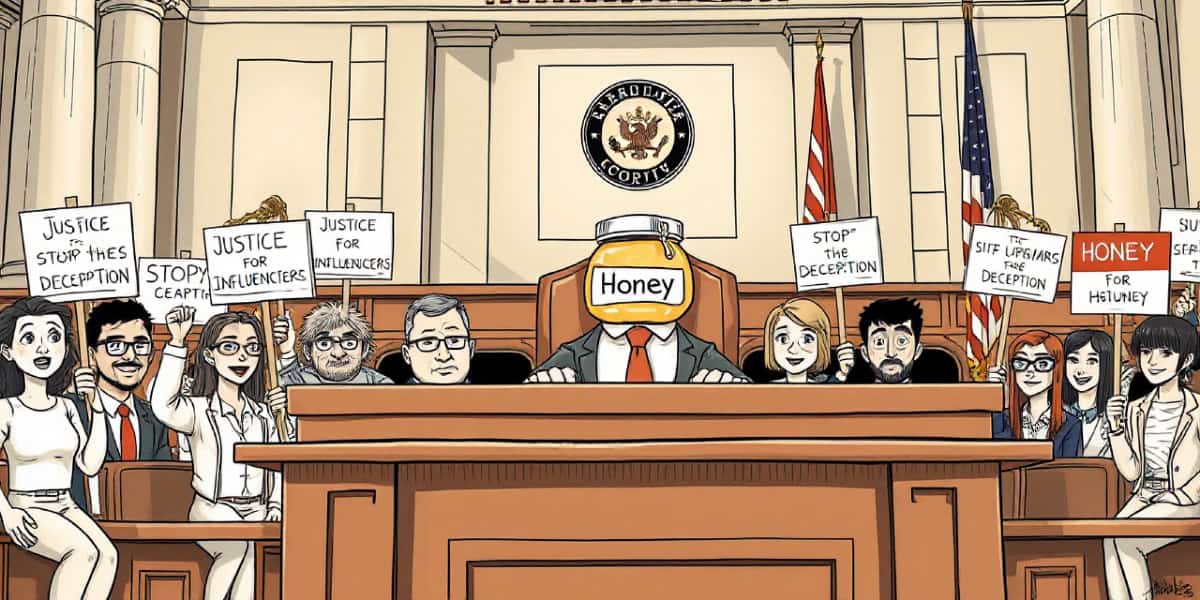You may have heard about Honey being sued in two class-action lawsuits. These lawsuits accuse Honey of unethical affiliate marketing practices that harm content creators and users. Allegations include replacing influencers’ affiliate links during checkout and prioritizing partner discounts over better public coupons. Plaintiffs claim these actions redirect commissions to Honey, depriving creators of rightful earnings. LegalEagle and others seek damages exceeding $5 million, with potential financial impacts reaching billions. This case could reshape affiliate marketing, as it challenges fairness in a system driving 20% of U.S. e-commerce revenue on Cyber Monday.
Key Takeaways
Honey is facing serious allegations of unethical affiliate marketing practices, including replacing creators’ affiliate links, which could deprive them of rightful earnings.
The lawsuits could lead to significant changes in how affiliate marketing operates, potentially enforcing stricter regulations that ensure fair compensation for content creators.
Users should be aware that these legal challenges may impact the reliability of Honey’s services and the quality of deals they receive, raising questions about data privacy and trust.
The outcome of these lawsuits could set important precedents for the e-commerce industry, influencing how platforms like Honey interact with creators and consumers in the future.
Monitoring the developments in this case is crucial, as it may redefine affiliate marketing practices and affect the tools you use for online shopping.
Background of the Lawsuit

Overview of Honey
Honey’s role in e-commerce and its popularity.
Honey has become a household name in the e-commerce world. You might know it as a browser extension that helps users find discounts and save money during online shopping. Its success stems from its ability to simplify the coupon application process at checkout. Honey uses data analytics to refine its marketing strategies, ensuring it stays ahead in a competitive market. By personalizing marketing efforts and tracking campaign performance, the company identifies new growth opportunities.
The rise of e-commerce platforms has also played a significant role in Honey’s popularity. As more consumers turn to online shopping, tools like Honey have become essential for finding deals. This demand has driven innovation in the market, with Honey leading the charge in making online shopping more accessible and cost-effective.
Timeline of Events
Key events leading to the lawsuits.
The lawsuits against Honey didn’t emerge overnight. On December 22, 2024, Jonathan ‘MegaLag’ released a video accusing Honey of fraudulent practices. He claimed that Honey’s browser extension replaced creators’ affiliate links with its own, causing creators to lose revenue. This video sparked widespread attention and raised questions about Honey’s business practices.
Shortly after, Devin ‘LegalEagle’ Stone took action. He filed a class-action lawsuit against Honey, inviting other affected creators to join. This marked a turning point, as the allegations gained legal traction and brought Honey’s practices under scrutiny.
Filing details of the lawsuits.
The lawsuits were officially filed on January 2, 2025. One of the cases, Wendover Productions, LLC v. PayPal Inc., was filed in an unspecified jurisdiction. Another class-action lawsuit targeted PayPal-owned Honey, citing multiple claims. These included intentional interference with contract relations, unjust enrichment, and violations of California’s Unfair Competition Law. The plaintiffs are seeking damages for the alleged harm caused by Honey’s practices.
Date | Jurisdiction | Case Title |
|---|---|---|
January 2, 2025 | N/A | Wendover Productions, LLC v. PayPal Inc. |
January 2, 2025 | N/A | Class action lawsuit against PayPal-owned Honey |
Parties Involved
Creators and LegalEagle as plaintiffs.
The plaintiffs in these lawsuits include prominent creators like Devin ‘LegalEagle’ Stone. They argue that Honey’s practices have deprived them of rightful earnings. LegalEagle, a well-known legal content creator, has taken a leading role in the case. His involvement has brought significant attention to the issue, encouraging other creators to come forward.
Kristensen Law Group’s role in the case.
The Kristensen Law Group represents the plaintiffs in this legal battle. Their expertise in handling complex class-action lawsuits has been instrumental in building the case against Honey. By focusing on the alleged unethical practices, they aim to hold Honey accountable and secure justice for the affected creators.
Allegations and Legal Claims
Specific Accusations
Allegations of affiliate link manipulation
You might wonder why Honey faces such serious accusations. The lawsuits claim that Honey manipulates affiliate links to unfairly benefit itself. Here’s how:
Honey allegedly replaces creators’ affiliate cookies with its own during checkout.
It takes credit for sales without contributing to the transaction.
This practice redirects commissions meant for influencers to Honey.
The lawsuits argue that this behavior harms content creators by depriving them of rightful earnings. Honey’s rewards program reportedly plays a role in this manipulation. By interacting with shoppers during checkout, it captures the last click and overrides the original affiliate link. This raises ethical concerns about fairness in affiliate marketing.
Claims of fraud and commission theft
The lawsuits also accuse Honey of fraudulent practices. By hijacking affiliate commissions, Honey allegedly undermines trust in its service. Influencers and creators lose income, while consumers unknowingly participate in this process. These actions could damage Honey’s reputation and credibility.
The impact of these allegations is already visible. Reports suggest that Honey lost 3 million users after the accusations surfaced. This highlights the growing mistrust among both creators and consumers.
Legal Basis for the Lawsuit
Relevant laws cited in the lawsuits
The lawsuits cite several legal grounds to support their claims. These include:
Intentional Interference with Prospective Economic Relations
Unjust Enrichment
Violation of California’s Unfair Competition Law
Conversion
Each of these laws addresses specific aspects of Honey’s alleged misconduct.
How these laws apply to Honey’s practices
The plaintiffs argue that Honey’s actions disrupt existing contracts between creators and affiliate networks. For example, the claim of Intentional Interference with Contractual Relations requires proof that Honey knowingly disrupted valid agreements. Similarly, the accusation of Unjust Enrichment focuses on Honey benefiting at the expense of creators without providing value.
The lawsuits also seek injunctive relief, asking the court to stop Honey from continuing these practices. If proven, these claims could set a precedent for how affiliate marketing platforms operate in the future.
Potential Consequences
Impact on Honey
Financial and reputational risks
The lawsuits against Honey could lead to significant financial and reputational challenges. If the allegations hold, Honey may face fines, compensation payouts, and legal fees. These costs could disrupt its operations and profitability.
Honey’s alleged manipulation of affiliate links undermines trust between creators and brands. This erosion of trust could make it harder for creators to secure future deals.
Every replaced affiliate link represents lost commissions and proof of successful conversions for creators. This weakens their ability to demonstrate value to brands.
A successful lawsuit might force browser extensions to stop overriding affiliate tracking, reshaping the e-commerce landscape.
Reputationally, Honey risks losing consumer confidence. The attention surrounding these lawsuits has already sparked debates about ethical standards in affiliate marketing. If Honey fails to address these concerns, it could lose users and partnerships.
Possible changes to Honey’s business practices
The lawsuits may compel Honey to revise its business model. You might see the company adopting stricter compliance measures to align with industry standards.
Honey could face regulatory oversight, including audits, to ensure ethical practices.
Injunctive relief might require Honey to stop replacing affiliate links and increase transparency in its operations.
To rebuild trust, Honey may need to reassess its relationships with creators and affiliate marketers.
These changes could reshape how Honey interacts with users and partners, potentially setting a new standard for e-commerce tools.
Impact on Users
Concerns about data privacy and service reliability
As a user, you might wonder how these lawsuits affect you. The allegations raise questions about data privacy and the reliability of Honey’s services. If Honey prioritizes its interests over user benefits, it could compromise the quality of discounts and deals.
Additionally, regulatory scrutiny might lead to changes in how Honey collects and uses data. While this could improve transparency, it might also disrupt the seamless experience you expect from the platform.
Broader Industry Implications
Precedents for affiliate marketing practices
The outcome of these lawsuits could set important precedents for affiliate marketing. In 2020, marketers lost $1.4 billion to affiliate marketing fraud, highlighting the need for stricter regulations.
A successful lawsuit might redefine how affiliate links are managed, ensuring fair compensation for creators.
Cookie-stuffing, a common issue, could transition from a civil breach to a federal violation, leading to harsher penalties.
Stricter compliance requirements could emerge, altering the dynamics between affiliates, networks, and merchants.
Potential regulatory changes in the tech industry
The lawsuits against Honey could trigger broader regulatory changes. You might see increased scrutiny of affiliate marketing practices, especially regarding creator rights.
Federal regulations could establish clearer guidelines for platforms like Honey.
Stricter rules might protect creators from unfair practices, ensuring accountability in the industry.
These changes could influence how e-commerce platforms operate, prioritizing ethical standards and user trust.
The implications of these lawsuits extend beyond Honey, potentially reshaping the future of affiliate marketing and e-commerce.
Public and Industry Reactions

Public Response
Reactions from users and social media discussions
You might have noticed that the lawsuits against Honey have sparked widespread discussions online. Social media platforms, especially Reddit, have become hubs for debates about the allegations.
Many users on Reddit have expressed skepticism about the lawsuits. Some question whether the claims against Honey are exaggerated or if they reflect broader issues in affiliate marketing.
Others have shown support for affected creators. They encourage influencers to join LegalEagle’s efforts to hold Honey accountable.
Influencers have also voiced their concerns. They worry about the impact of Honey’s alleged practices on their earnings and credibility. This controversy has already caused a significant drop in Honey’s user base. Many users feel uneasy about continuing to use the platform, given the ethical questions raised by the lawsuits.
These reactions highlight growing mistrust among consumers and creators. They also show how public opinion can influence the reputation of companies like Honey.
Competitor and Expert Opinions
Statements from competitors
Competitors have not stayed silent about the lawsuits. Some have pointed out that Honey’s practices may exploit affiliate marketing rules. This has created friction within the industry.
LegalEagle’s mention of unfair practices reflects broader grievances among competitors. Many believe Honey’s actions undermine the integrity of affiliate marketing.
Honey, however, insists it operates within industry norms. Its spokesperson claims the company follows established rules, suggesting a defense against these allegations.
This legal battle has also highlighted the challenges faced by content creators. Influencers worry about losing income due to unfair practices, which adds to the competitive tension in the industry.
Insights from legal and industry experts
Experts believe the lawsuits could lead to significant changes in the affiliate marketing landscape.
The lawsuits might push platforms like Honey to adopt stricter rules for handling “last click attribution.” Some experts suggest clearer disclaimers or features allowing creators to lock their affiliate links.
PayPal, Honey’s parent company, may deny wrongdoing and fight the case vigorously. Class-action lawsuits often take years to resolve, with multiple appeals and motions.
The outcome could ripple across the industry. If Honey is found liable, other coupon extensions might face similar lawsuits or adjust their practices to avoid legal risks. These insights show why this case matters not just for Honey but for the entire e-commerce ecosystem.
The lawsuits against Honey highlight serious concerns about its affiliate marketing practices. Allegations include replacing influencers’ tracking links with its own and prioritizing partner discounts over better public deals. These actions could harm both creators and consumers.
Influencers may lose rightful commissions, reducing their income and trust in affiliate programs.
Consumers might not always receive the best deals, affecting their shopping experience.
If proven, these claims could reshape the e-commerce industry. Stricter regulations may emerge, forcing platforms to adopt fairer practices. You might see changes in how browser extensions handle affiliate tracking, ensuring transparency and accountability.
For users, the lawsuits raise questions about rewards and cashback reliability. Confidence in Honey’s platform could decline, impacting your overall experience. Monitoring this case is crucial, as its outcome could redefine affiliate marketing and influence the tools you rely on for online shopping.
FAQ
What is Honey accused of in these lawsuits?
Honey faces accusations of replacing creators’ affiliate links with its own during checkout. This allegedly redirects commissions to Honey, depriving creators of their earnings. The lawsuits also claim Honey prioritizes partner discounts over better public deals, raising ethical concerns about fairness.
Why are creators like LegalEagle suing Honey?
Creators argue that Honey’s practices harm their income and credibility. By allegedly hijacking affiliate commissions, Honey disrupts their agreements with brands. LegalEagle and others believe these actions violate laws protecting contractual and economic relationships, prompting them to seek justice.
How could this lawsuit affect you as a user?
The lawsuit raises concerns about data privacy and service reliability. If Honey prioritizes its interests, you might not always get the best deals. Regulatory changes could also alter how Honey operates, potentially impacting your shopping experience.
Why is this case important for the e-commerce industry?
This case challenges the fairness of affiliate marketing practices. If the plaintiffs succeed, it could set stricter rules for platforms like Honey. These changes might protect creators’ rights and ensure ethical standards across the e-commerce ecosystem.
What happens if Honey loses the lawsuit?
If Honey loses, it might face fines, compensation payouts, and stricter regulations. The company could also need to revise its business practices, such as stopping affiliate link replacements. This outcome could reshape how browser extensions handle affiliate marketing.






so like, what did honey even do wrong? i use it all the time and its saved me loads. is it really stealing or just a big misunderstanding?
This is why I trust no one with my data, not even a browser extension that saves me a few bucks, knew there was a catch.
Go LegalEagle! It’s about time someone stood up to the big tech companies. Hope they get what they deserve!
wait, so how does manipulating affiliate links even work? sounds complex, is it a big deal?
another day, another tech company caught red-handed. we’re just pawns in their big game of chess, thinking we’re saving money while they’re lining their pockets.
in my days, we saved money by comparing prices in the actual store, not some fancy tool doing who knows what with our info.
interesting read, didn’t know much about this before but i hope they sort it out, love using honey for the coupons
This case could really set a precedent, you know? If Honey goes down, it’s like a domino effect for all similar tech. Not saying they’re innocent, but it’s complex.
Team Reviewify, can u break it down more simple? like, what’s the deal with affiliate stuff and how’s it stealing?
I think you’re overreacting, I’ve been using Honey for years and never had any problems.
Seems like every time you turn around, there’s a new lawsuit about something online. Hard to keep track of what’s what anymore.